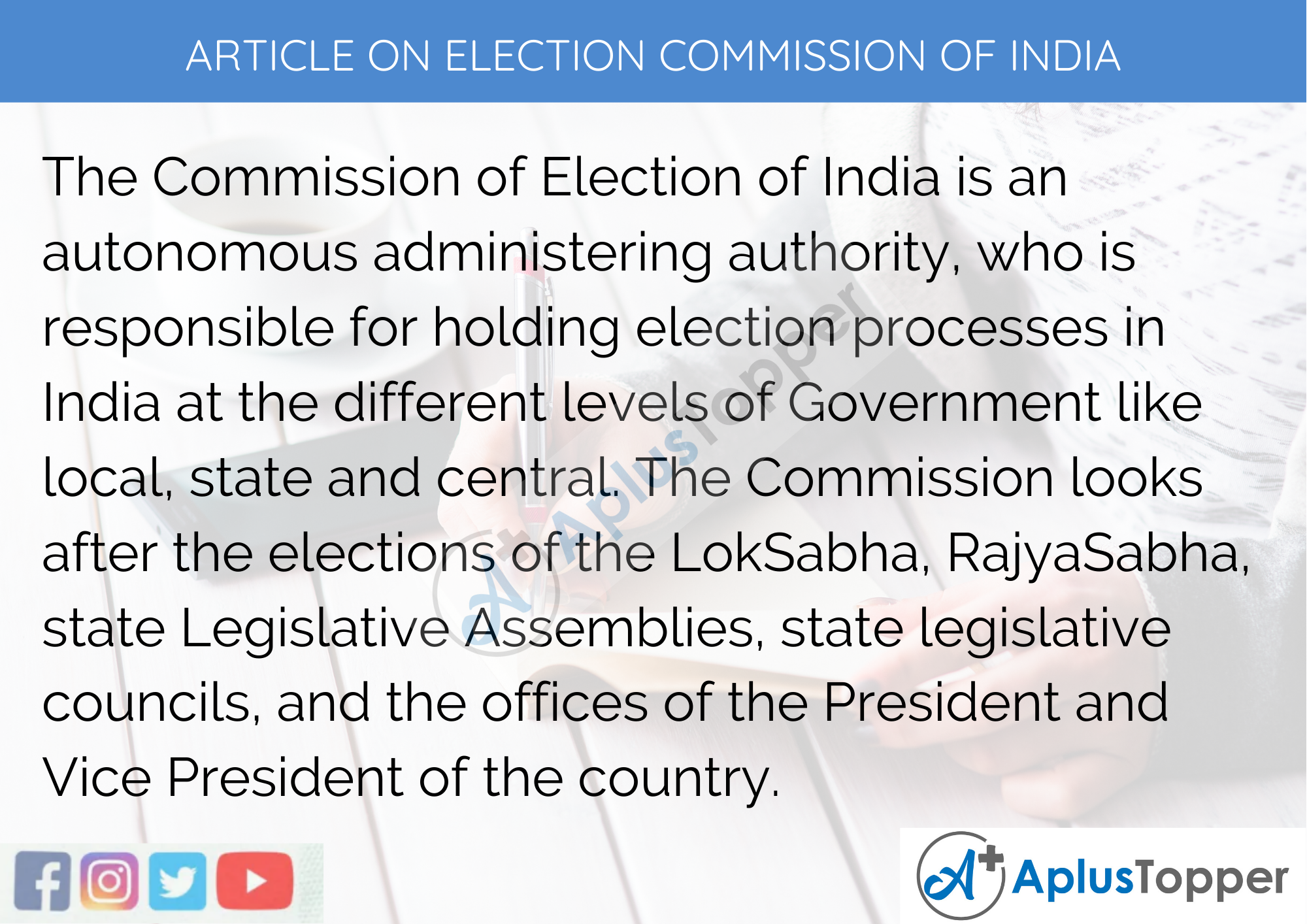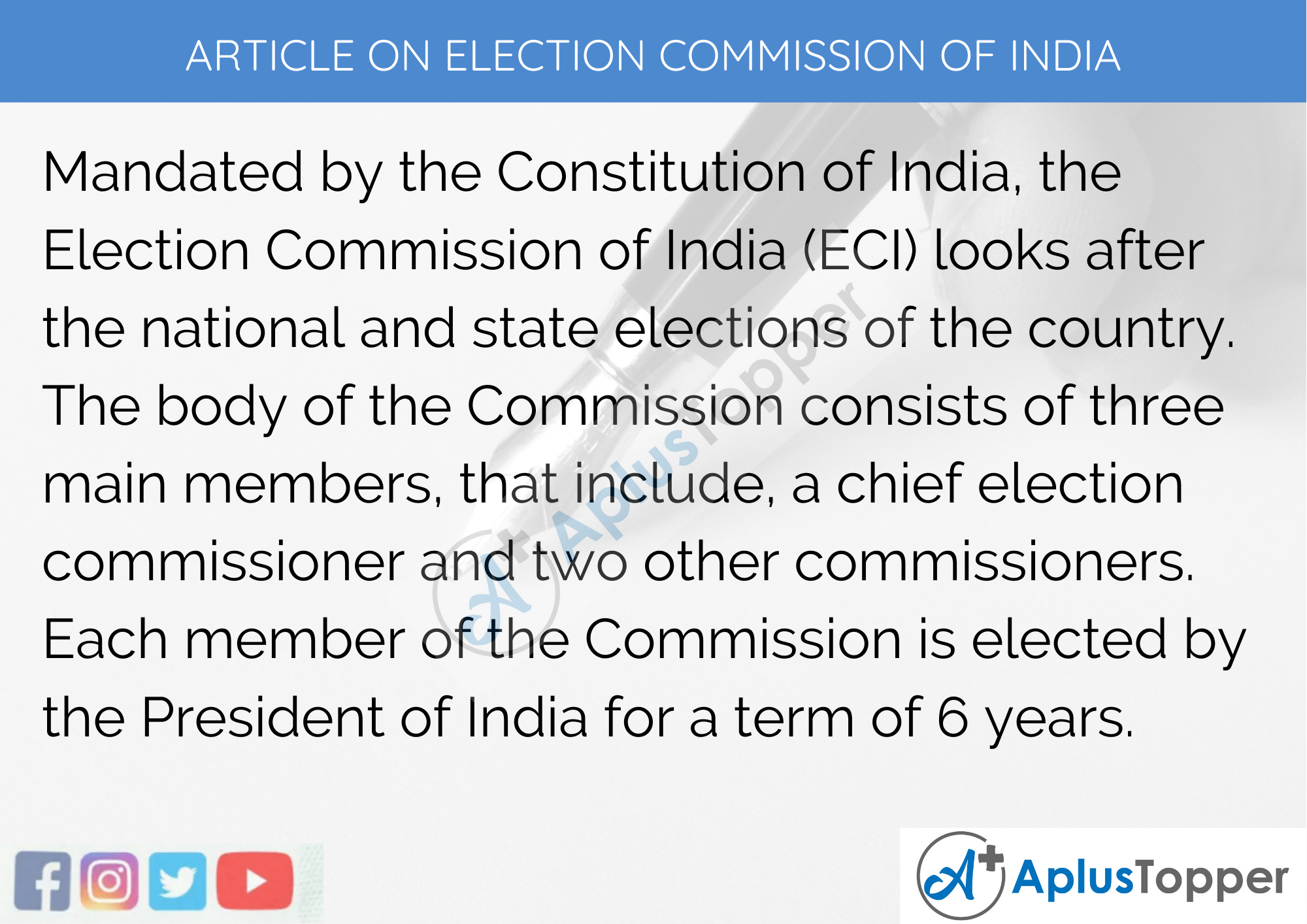Article On Election Commission Of India: Formed on 25 January 1950 (consequently celebrated as National Voters Day), the Election Commission of India are an autonomous body that governs the election processes in India at national, state and district levels.
This constitutional authority is in charge of elections for the LokSabha, RajyaSabha, State legislative assemblies and offices of the President as well as Vice President of the country.
You can read more Article Writing about people, sports, technology many more.
Long And Short Articles On Election Commission Of India for Students and Children In English
The Election Commission of India is an important aspect of the Constitution of the country. Though old, it is a relevant topic of discussion among all age groups. The extended Article On Election Commission Of India are useful for students studying in classes 7, 8, 9, and 10. On the other hand, the short Article On Election Commission Of India is relevant for the students of classes 1, 2, 3, 4, 5, and 6.

Long Article On Election Commission Of India 500 Words In English
The Commission of Election of India is an autonomous administering authority, who is responsible for holding election processes in India at the different levels of Government like local, state and central.
The Commission looks after the elections of the LokSabha, RajyaSabha, state Legislative Assemblies, state legislative councils, and the offices of the President and Vice President of the country. The Election Commission gets its power from the Constitution under article 324.
The Election Commission of India has the powers under the Constitution. So, it is required to act in a particular manner when the laws of the Government makes insufficient provisions or judgements to deal with a specific situation that has aroused in the conduct of an election.
The Commission is a constitutional authority; it is amongst the few institutions that work equally with freedom and autonomy. It has the privilege to work along with the country’s higher judiciary, the Union Public Service Commission and the Comptroller and Auditor General of India.
The Commission was founded in the year 1950 and originally had only one Chief Election Commissioner. Later, for the first time in the history of India on 16 October 1989 (on the eve of the 1989 GeneralElection), two additional Commissioners were appointed to the election commission. Although they were newly appointed, they had a brief period of service that ended in the year 1990.
The Election Commissioner Amendment Act, of 1989 was adopted by the Government on 1 January 1990. This act turned the Commission into a multi-member body. Since then till now there has been 3-member.
The Commission in operation and votes make all the important decisions by the Commission. The side that receives a majority of the votes of the members win. The Chief Election Commissioner along with the other two are usually IAS officers who have retired or taken voluntary retirement to draw their salaries and allowances at the same level as those of the Judges of the supreme court. This was done as per the rules of the Chief Election Commissioner and other Election Commissioners (Conditions of Service), 1992.
At the central level, the Commission is assisted by a secretariat. But in case of the state, the election commission of India is assisted by the Chief Electoral Officer of the State. Whereas in the districts and constituency levels, there are District Magistrates or known as District Election Officers, Returning officers, and Electoral Registration and who perform election work.
One of the essential features of Indian democracy is that in India, elections are held at regular intervals of the year. It is essential to hold periodic, free and fair elections in a democratic country like India. The Election Commission of India is regarded as the guardian of elections in the country. The Commission lays down guidelines that one has to follow during the conduct of political parties and candidates during an election period.
However, there have been several cases of violation of the code by various political parties where they had misused the official machinery by the candidates.
Short Article On Election Commission Of India 300 Words In English
Mandated by the Constitution of India, the Election Commission of India (ECI) looks after the national and state elections of the country.
The body of the Commission consists of three main members, that include, a chief election commissioner and two other commissioners. Each member of the Commission is elected by the President of India for a term of 6 years. The members have secured tenure and cannot be dismissed without parliamentary impeachment.
This makes the body free from any political influence and neutral. The authority supervises controls and directs all the electoral processes of the country; it maintains all the electoral rolls and also sees to the official list of registered voters.
One of the crucial duties of the Commission is to nominate candidates for various positions and sanctioning the different political parties in the national and state level.
Looking after the polling booths and declaring the final results overseas is another vital function of the authority. The Commission can, however, be challenged in the court of law, in spite of such decisive authority.
India is one of the world’s most populous democracy, included in its first general election roughly around 700 million voters across 700000 polling booths in various parts of the country. The numbers have only increased in the past years.
Thus, the ECI operates through a vast number of staff members of around 300 with each state having a separate chief electoral officer. During general elections, an enormous team is recruited as temporary workers in order to control and smoothly conduct the polling.
The Election Commission has divided the country into 543 Parliamentary Constituencies, each of which returns one MP to the Lok Sabha, (the lower house of the Parliament).
All the twenty-nine states and two among the seven union territories have their respective assemblies, the Vidhan Sabhas. The total of thirty-one assemblies consists of 4120 constituencies.
Considering the enormous number of citizens present in the country; the ECI has done and proved to be one of the best commissions in the Indian subcontinent.

10 Lines On Election Commission Of India
- The Commission acts under the guidance of the Constitution as per Article 324 the Commission is among the few institutions which function with autonomy as well as freedom.
- The Commission has its headquarters in the national capital of Delhi, (NirvachanSadan, Ashoka Road).
- The election commission of India is among one of the essential administrative bodies of India.
- The subsidiaries of Election Commission of India are present in every state, and they are called the state election commission.
- The Indian electorate witnesses more than 800000 polling stations along with the number of people exceeding 668 million.
- People who are registered successfully to vote are allowed to vote can enter the voting premises, and after voting, they have to clear the area.
- Army and proper staff are allotted in every voting booth to maintain the voting process smoothly.
- Precautions like allotting of police and army are done near each booth to prevent certain malpractices like vote-rigging, booth jamming, false voting, etc.
- If the need ever rises then the election commission also conducts by-election.
- If some significant code of conduct is broken, then the Election Commission can take steps like disqualification of a candidate or even the cancellation of the election at an extreme.
FAQ’s on Article On Election Commission Of India
Question 1.
What are the three main categories of electors in India?
Answer:
There are namely three categories of electors in India, they are: General electors, overseas (NRI) electors and Service electors.
Question 2.
Who elects the President of India?
Answer:
The President of India is elected by the elected members of both the Loksabha and Rajyasabha members along with the members of the legislative assemblies of all states and union territories.
Question 3.
What is the function of the Election Commission of India (ECI)?
Answer:
The primary role of the election commission is to hold elections peacefully, fairly and make sure that the people are able to vote freely without being harassed or forced by any political party.
Question 4.
What do you mean by the term ‘model code of conduct’?
Answer:
The code of model conduct refers to the guidance of the candidates as well as the political parties which they should abide by, while an election is being conducted.
